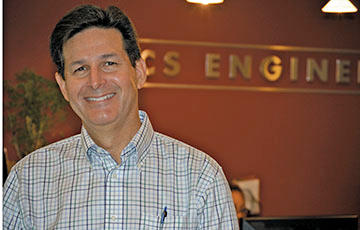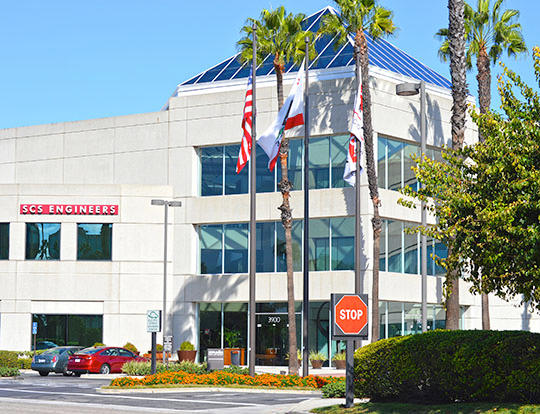Founded in Long Beach in 1970, environmental contracting and consulting company SCS Engineers has expanded significantly over the decades and now has about 800 employees in more than 60 offices across 32 states. The company, which provides a dizzying array of environmental services to public and private clients, remains headquartered in Long Beach.

SCS Engineers, an environmental consulting and contracting firm, has been based in Long Beach since it was founded in 1970. Its corporate headquarters are at Kilroy Airport Center. Vice President Julio Nuno, pictured, oversees the company’s environmental services. He said SCS Engineers expects its land remediation and other services for property developers to be in high demand locally over the next few years due to a strong local commercial real estate market. (Photograph by the Business Journal’s Larry Duncan)
SCS Engineers has divisions dedicated to construction of environmental systems, management of environmental control facilities, clean air monitoring, and technology for tracking environmental data. As environmental regulations become increasingly complex, particularly in California, SCS continues to monitor legislation and assess both current practices and potential areas for growth.
“We track new legislation . . . to see how that would affect our business and to see if that is an area we should start getting geared up for,” SCS’s Julio Nuno, vice president overseeing environmental services, told the Business Journal in an interview at the company’s headquarters. “I think we have probably grown the most over the last five to 10 years. We have grown by acquisition.”
About 60 percent of SCS Engineers’ business is in the field of solid waste, according to Nuno. Specifically, the company is most active in the design, construction and management of landfills. “One of the things SCS is known for is our work in the solid waste business,” Nuno said. “We do a lot of work associated with landfills – siting and designs and expansions.”
But SCS doesn’t just build and monitor landfills – the company also has a division dedicated to capturing the energy generated by decomposing materials. The company has about 30 biogas-fueled power plants either completed or planned. “We do have an energy division that is involved in designing systems that will take the methane gas and use it like in a micro turbine and generate electricity,” Nuno explained. This energy is often used to offset the energy needs of landfill operations.
SCS’s expertise in this area may prove a future growth area for the company due to upcoming organics waste recycling requirements. The State of California recently passed legislation mandating governmental jurisdictions such as cities and counties to oversee organics waste recycling. It requires these jurisdictions to have facilities and systems in place to enable organics waste recycling, one option being the sort of energy-capturing systems engineered by SCS. “That is really where things seem to be heading, is away from our landfills and trying to use other processes to keep [waste] from going into landfills,” Nuno said.
Another area of growth for SCS is environmental remediation of property for development, also known as “brownfield” projects. “On that side of our business our work is really tied to the real estate market,” Nuno said. While commercial real estate development experienced a lull during the Great Recession, “it seems to be coming back very strongly now,” Nuno observed, referring to local developments such as Douglas Park.

SCS Engineers’ Long Beach headquarters. (Photograph by the Business Journal’s Larry Duncan)
“Right now, we see a lot of demand in our services for assessing and cleaning up pieces of property in preparation for development,” Nuno said. SCS does a lot of work in Phase 1 environmental assessments associated with regulatory due diligence processes required before a developer can build on a site that may need remediation, he explained.
A major past brownfield project by SCS was the remediation for the Autoclub Speedway of California in Fontana, built on the site of a former steel mill. SCS was also involved in remediation for Petco Park, where the San Diego Padres play, and for land around the Staples Center in Los Angeles. SCS has provided land remediation services to the City of Long Beach along downtown’s shoreline, Pine Avenue and Long Beach Boulevard, Nuno pointed out.
Currently, SCS is working with a client who owns multiple pieces of property in the Long Beach area. “That client has a piece of property in the Douglas Park development, and so there are some environmental issues associated with Boeing and their predecessor’s operations,” Nuno said. “So they had us kind of review and let them know what they needed to do.”
Due to past and current oilfield exploration, Long Beach and other local cities such as Signal Hill have called upon SCS’s services to ensure land is safe to build on. “There are some issues associated with those old oil field properties,” Nuno said. For example, some former oil field sites have old sumps left behind, which contain drilling muds used in oil extraction that have “elevated concentrations of petroleum hydrocarbons and some metals,” he explained. SCS assesses these sumps and cleans them up.
“Then we will do methane gas assessments because . . . the old abandoned wells sometimes leak, so you will have the potential for methane gas to accumulate,” Nuno said. “We will design protection systems for buildings if we think that methane gas could be a problem. We did a lot in the past for the City of Long Beach.”
Many of SCS’s other services involve monitoring and preventing various substances from industrial operations such as oil drilling or even dry cleaning from entering storm water, groundwater supplies, soil and the air. For example, SCS frequently works with gas stations to replace their underground storage tanks to prevent gas from leaking into the ground.
“We also do a lot of assessments on releases from dry cleaning facilities,” Nuno said. “Typically they don’t handle their solvents very well and it has resulted in some releases to the ground. And sometimes, it is not only a problem for soil, but it also could get into groundwater,” he continued. “And there is something called a vapor migration, too. So those vapors can migrate independently and get up into structures.”
Not only does SCS help contribute to a cleaner environment and more energy and environmentally efficient practices by public and private entities, the company is also dedicated to implementing its own sustainable business practices. “I have worked at SCS now for 33 years, and for as long as I can remember we have always collected paper,” Nuno said. “We have a recycling program for the paper we generate.” At the company’s Long Beach headquarters, at the Kilroy Airport Center, employees also use reusable plates, mugs and utensils, he noted. Additionally, many of the company’s fleet vehicles are hybrid cars.
